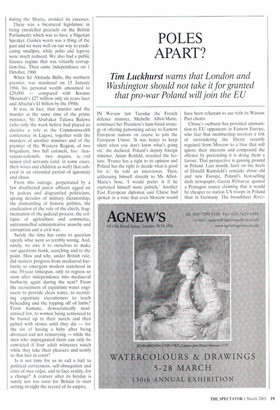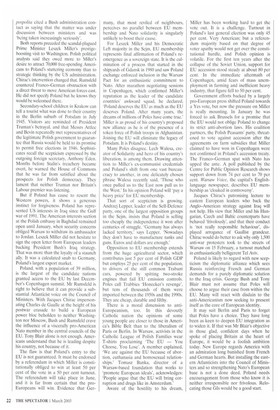POLES APART?
Tim Luckhurst warns that London and
Washington should not take it for granted that pro-war Poland will join the EU
IN Warsaw last Tuesday the French defence minister, Michelle Alliot-Marie, continued her President's ham-fisted strategy of offering patronising advice to Eastern European nations on course to join the European Union. 'It was better to keep silent when you don't know what's going on.' she declared. Poland's deputy foreign minister, Adam Rotfeld, resented the lecture. 'France has a right to its opinion and Poland has the right to decide what is good for it,' he told an interviewer. Then, addressing himself directly to Ms AlliotMarie's boss, 'I would prefer it if he expressed himself more politely.' Another East European diplomat said Chirac had Token in a tone that even Moscow would
have been reluctant to use with its Warsaw Pact clients.
Chirac's outburst has provided ammunition to EU opponents in Eastern Europe, who fear that membership involves a risk of surrendering the liberty recently regained from Moscow to a bloc that will ignore their interests and compound the offence by pretending it is doing them a favour. That perspective is gaining ground in Poland. Last month, hard on the heels of Donald Rumsfeld's remarks about old and new Europe, Poland's best-selling daily newspaper, Gazeta Wybarcza, quoted a Pentagon source claiming that it would be cheaper to station US troops in Poland than in Germany. The broadsheet Itzec.:
pospolita cited a Bush administration contact as saying that the matter was under discussion between ministers and was 'being taken increasingly seriously'.
Both reports preceded the scandal-plagued Prime Minister Leszek Miller's prestigeboosting visit to Washington. Polish political analysts said they owed more to Miller's desire to attract 70,000 free-spending Americans to Poland's stuttering economy than to strategic thinking by the US administration. Chirac's intervention changed that. Rumsfeld countered Franco–German obstruction with a direct threat to move American forces east. He did not specify Poland but he knows they would be welcomed there.
Secondary-school children in Krakow can tell a tourist what was done to their country in the Berlin suburb of Potsdam in July 1945. Visitors are reminded of President Truman's betrayal, and that Messrs Attlee and Bevin repeatedly met representatives of the legitimate Polish government to guarantee that Russia would be held to its promise to permit free elections in 1946. Sophisticates recall the scepticism expressed by the outgoing foreign secretary, Anthony Eden. Months before Stalin's treachery became overt, he warned the House of Commons that he was far from satisfied about the prospects for Polish democracy. They lament that neither Truman nor Britain's Labour premier was listening.
But if Poland has cause to resent the Western powers, it shows a generous instinct for forgiveness. Poland has represented US interests in Iraq since the Gulf war of 1991. The American interests section at the Polish embassy in Baghdad remained open until January, when security concerns obliged Warsaw to withdraw its ambassador to Jordan. Leszek Miller did not hesitate to sign the open letter from European leaders backing President Bush's Iraq strategy. That was more than the loyalty of a staunch ally. It was a calculated snub to Germany, Poland's largest export market.
Poland, with a population of 39 million, is the largest of the candidate nations granted access to the EU by last December's Copenhagen summit. Mr Rumsfeld is right to believe that it can provide a substantial Atlanticist voice on the Council of Ministers. With Jacques Chirac impersonating Charles de Gaulle at the height of his postwar crusade to build a European power bloc beholden to neither Washington nor Moscow, Bush and Rumsfeld crave the influence of a viscerally pro-American Nato member in the central councils of the EU. Tony Blair alone is not enough. Americans understand that he is leading despite his country, not because of it.
The flaw is that Poland's entry to the EU is not guaranteed. It must be endorsed by a referendum in which Miller is constitutionally obliged to win at least 50 per cent of the vote in a 50 per cent turnout. The referendum will take place in June, and it is far from certain that the proEuropeans will win. Evidence that Ger
many, that most reviled of neighbours, perceives no parallel between EU membership and Nato solidarity is singularly unlikely to boost their cause.
For Leszek Miller and his Democratic Left majority in the Sejm. EU membership represents final affirmation of Poland's reemergence as a sovereign state, It is the culmination of a process that started in the shipyards of Gdansk in 1980 and saw Poland exchange enforced inclusion in the Warsaw Pact for an enthusiastic commitment to Nato. After marathon negotiating sessions in Copenhagen, which confirmed Miller's reputation as the leader of the candidate countries' awkward squad, he declared, 'Poland deserves the EU as much as the EU deserves Poland. After many years, the dreams of millions of Poles have come true.' Miller is as proud of his country's proposed new alliance as he is of the presence of a token force of Polish troops in Afghanistan. Joining the EU will eliminate the legacy of Potsdam. It is Poland's destiny.
Many Poles disagree. Lech Walesa, creator of Solidarity and hero of his country's liberation, is among them. Drawing attention to Miller's ex-communist credentials and Poland's shift from one vast bureaucracy to another, in one delicately chosen phrase Walesa recently said, 'Those who once pulled us to the East now pull us to the West.' In his opinion Poland will 'pay a heavy price' for EU membership.
That sort of scepticism is growing. Andrzej Lepper, leader of the Self-Defence party, one of the largest opposition groups in the Sejm, insists that Poland is selling too cheaply the independence it won after centuries of struggle. 'Germany has always lacked territory,' says Lepper. 'Nowadays they don't have to manufacture tanks and guns. Euros and dollars are enough.'
Opposition to EU membership extends from the huge agricultural sector, which contributes just 5 per cent of Polish GDP but employs 25 per cent of the population, to drivers of the still common Trabant cars, powered by spitting two-stroke engines that fail EU emission controls. Poles call Trabbies `Honecker's revenge', but tens of thousands of them were imported between the 1950s and the 1990s. They are cheap, durable and filthy.
There is a moral dimension to antiEuropeanism, too. In this devoutly Catholic nation the opinions of some young people are closer to those in America's Bible Belt than to the liberalism of Paris or Berlin. In Warsaw, activists in the Catholic League of Polish Families wear T-shirts proclaiming The EU — You Choose, You Lose'. A member explained, 'We are against the EU because of abortion, euthanasia and homosexual relationships.' Tomasz Banka, director of a Warsaw-based foundation that works to 'promote European ideals', acknowledges: 'People argue that the EU will bring corruption and drugs like in Amsterdam.'
Aware of the hostility to his dream, Miller has been working hard to get the vote out. It is a challenge. Turnout in Poland's last general election was only 45 per cent. Very American; but a referendum majority based on that degree of voter apathy would not get over the constitutional hurdle, and Polish opinion is volatile. For the first ten years after the collapse of the Soviet Union, support for EU accession stood steady at about 80 per cent. In the immediate aftermath of Copenhagen, amid fears of mass unemployment in farming and inefficient heavy industry, that figure fell to 50 per cent.
Government efforts backed by a largely pro-European press shifted Poland towards a Yes vote, but now the pressure on Miller is really mounting. In January he was forced to ask Brussels for a promise that the ELT would not oblige Poland to change its strict anti-abortion laws. His coalition partners, the Polish Peasants' party, threatened to vote against accession after the agreements on farm subsidies that Miller claimed to have won in Copenhagen were not confirmed in Poland's accession treaty. The Franco–German spat with Nato has upped the ante. A poll published by the Centre for Public Opinion Research shows support down from 74 per cent to 70 per cent. Warsaw Voice, the capital's Englishlanguage newspaper, describes EU membership as 'cloaked in controversy'.
Jacques Chime's patronising lecture to eastern European leaders who back the Anglo–American strategy against Iraq will not help. His view that Miller and his Hungarian, Czech and Baltic counterparts have behaved 'frivolously', and that their conduct is 'not really responsible behaviour', displayed arrogance of Gaullist grandeur. Chirac would do better to ask why only 1,500 anti-war protesters took to the streets of Warsaw on 15 February, a turnout matched in enthusiastically belligerent Tel Aviv.
Poland is likely to regard with new scepticism the diplomatic alliance which sees Russia reinforcing French and German demands for a purely diplomatic solution to the Iraq crisis. George Bush and Tony Blair must not assume that Poles will choose to argue their case from within the EU. Many will react with disdain to the anti-Americanism now seeking to present itself as the core of European identity.
It may suit Berlin and Paris to forget that Poles have a choice. They have long been as keen to deepen EU integration as to widen it. If that was Mr Blair's objective in those glad, confident days when he spoke of placing Britain at the heart of Europe, it would be a foolish ambition today. New Europe regards America with an admiration long banished from French and German hearts. But installing the eastern Atlanticists into the Council of Ministers and so strengthening Nato's European base is not a done deed. Poland needs encouragement from those who know it is neither irresponsible nor frivolous. Relocating those GIs would be a good start.



















































































 Previous page
Previous page